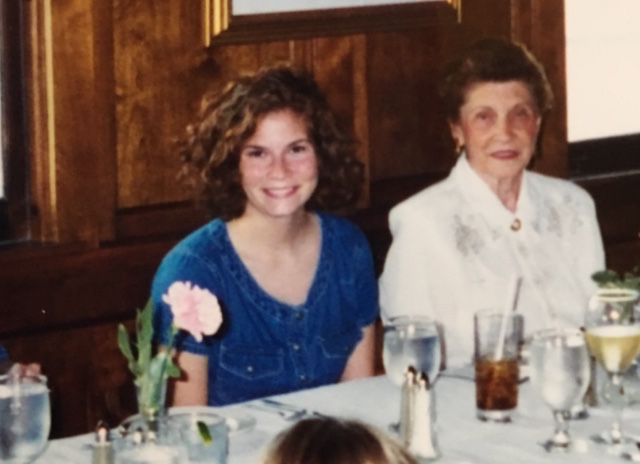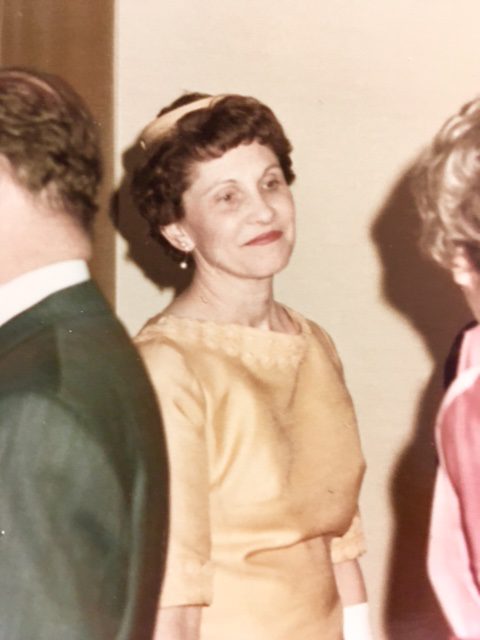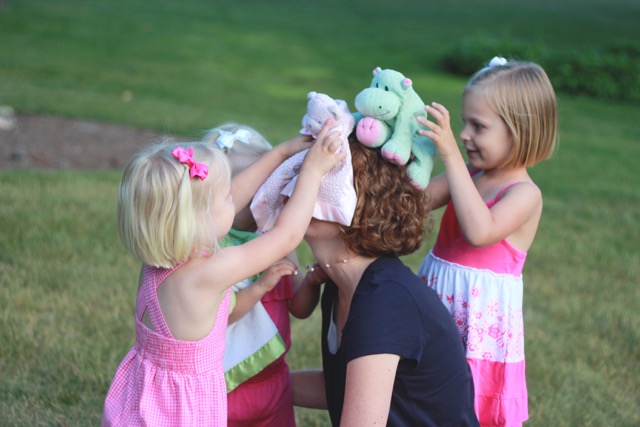I accompanied my grandmother to a doctor’s appointment last month. It was time to replace the battery in her pacemaker. Her two children were both thousands of miles away, and they wanted to know exactly what the doctor advised.
So after sending my kids to school, I drove one hundred miles to meet Grandma at her cardiologist’s office. On a clipboard I brought a list of questions from my dad and a bunch of documents proving that I was permitted to attend the appointment.

At 97, Grandma is declining. Until a few months ago, she could still make small talk. Pretending that she knew who I was, she would make jokes and talk about the weather. Little details would slip, though, that showed that she thought it was 1928. She had forgotten her long deceased husbands as well as her grandchildren, but somehow her chatting function remained intact. As did her vital signs. She is a very accomplished woman–not only does she have a PhD, but she has also “graduated” from hospice twice. My mom says she is made of steel.
When I arrived in the doctor’s waiting room, Grandma was moaning and crying in her wheelchair. The staff-member who had accompanied her from the nursing home, a good-natured woman named Nancy, was trying in vain to comfort her. Before stepping up to the check-in window, I knelt down beside Grandma, told her I was there, and asked what was wrong. Everything is terrible! she wailed. Nancy then told me, She thought the ride over was too rough.
After I checked us in, we took our seats. Grandma remained slumped in her wheelchair, giving out occasional moans. I gently reminded her who I was, where we were, and that everything was fine. I put my hand over hers.
Now I was the adult, tenderly guiding the woman who used to let me play with her jewelry and puzzle over her girdles. When I visited, she would let me watch her get ready in the morning. Perching on the bathtub, I would watch her apply cold cream, foundation, blush and lipstick. She would pull on her “panty hose” and choose a pantsuit from her walk-in closet, chatting the whole time.
Long gone is that professional woman with her extensive beauty regimen. No more does she talk of “pocket books” and “davenports.”

After a short wait, the nurse called us, and we ventured back to the examining room, leaving Nancy behind. As soon as we got there, Grandma whimpered that she wanted to lie down. The nurse–a fit young man–and I tried together to lift Grandma from her wheelchair and onto the table, but we could not manage it. She was just too heavy and awkward of a load. We gently told her that she was going to have to stay in her wheelchair. While the nurse asked me questions and tried to take her vital signs, Grandma continued to moan, her eyes closed.
As soon as the nurse left the room to fetch the doctor, Grandma’s crying increased. I need to lie down! she wailed. I’m going to faint! I pulled my chair over to sit next to her and put my hand reassuringly on her arm. Grandma, we cannot get you onto the table, but even if you faint, you will be fine. I know it feels uncomfortable, but I will hold you steady in your chair. I am here. You are safe. Her wailing increased, and then suddenly her head flopped onto her chest. Had she fainted? Had she abruptly fallen asleep? I could not tell. I felt around for her pulse, but could hardly find it.
After a minute or two, she raised her head slightly, keeping her eyes closed, and wailed again. We repeated the previous exchange and then, once again, her head fell abruptly onto her chest. The whole sequence happened yet one more time. I could not move her to the table, and I could not keep her from fainting, but I could sit nearby, holding her hand and speaking soothingly.
Just before the doctor arrived, she lifted up her head and declared, I’m going! When I asked where she was going, she said To heaven, I hope. I had no idea whether to take this literally. Was this the moment all of her 97 years had pointed? I could not tell.
The doctor arrived. Having been faxed my dad’s questions ahead of time, he got right down to answering them. Yes, it made sense that her pacemaker battery was dying. Yes, she would suffer if it was not replaced within the next month. Yes, it is standard to replace the battery in the pacemaker in a woman in her late 90s in declining health. I scribbled notes on my clipboard, listening hard and asking everything I could think to. After talking with me, he turned to Grandma, did a very brief exam–unlike me, he found her pulse–and asked her if she had any questions. She meekly shook her head, the calm, docile patient. After suggesting a date to schedule the procedure, he politely left the room.
As soon as we were alone, Grandma grew agitated again. She continued to moan and fret as I wheeled her out to the waiting room. I held her hand as we rode the elevator with Nancy, and as we waited in the lobby for their transport van to arrive. She grew more and more agitated, feebly yelling over and over, Let’s go! What are we waiting for?!, rejecting all our explanations. It took less than ten minutes for the van to arrive, but Grandma found the wait intolerable.
As the driver loaded her in her wheelchair into the van, I said Good-bye, Grandma. I love you. She looked at me and said, pointedly, I love you, too, but I wish you were coming in this car with me! She did not know who precisely I was, but she knew I was her safe person. The one she could rely on.
It turns out that I had been training for this role. No, not through my extensive medical experience with Rick, but through the many doctor’s visits I have done with young children. In my parenting years, I’ve been to the doctor for everything from strep throat to stitches, from colorectal polyps to purple toes. I know how to do this–how to hold the patient, speaking gently and soothingly, while I discuss my medical questions with the doctor. How to portray calm confidence to the child while getting all the detailed information I want from the doctor. I have done this so many times that it was second nature to slip into that role when it was my grandma who needed me to.

The very elderly resemble the very young. Just like little children, they need physical care, kind words, and gentle patience. Their well-being entirely depends on the well-meaning of others. Here in my able-bodied prime, I am hoping to display tangible kindness in such a way that my kids are one day able to emulate it when I’m the one whimpering in a wheelchair.
We must not fool ourselves–that day will come for most of us, indeed some would say it is the best case scenario. As hard as it was to see my grandmother so distressed, I felt honored to serve her in this way. What better can I offer the woman who bought me my only Cabbage Patch Kid?
©Laura Goetsch and Thinking About Such Things, 2016

So beautiful. Long life, health, and many years to your blessed grandma.
LikeLike
Thanks, Aaron. I don’t think she has many days left. She has entered hospice (again).
LikeLike
This resembles those dying at a younger age, too. When I cared for my dad at the end of his life, it reminded me significantly of taking care of a baby or toddler, except that he a.) had a will, and b.) was roughly 20 times the size. It is indeed a honor to be there, as hard as it is.
LikeLike
Yes. Thank you for commenting and sharing your experience of caring for the dying.
LikeLike
My own mom and I have had conversations about the comparison between my care of my children and her care of her dad. It can be hard, exhausting work that requires more patience, kindness and repetition of care than we have on our own strength. Good thoughts, Laura. Glad you are able to be close enough to help with her care.
LikeLike
Very true!
LikeLike
I love this!!
LikeLike
Really good stuff.
LikeLike